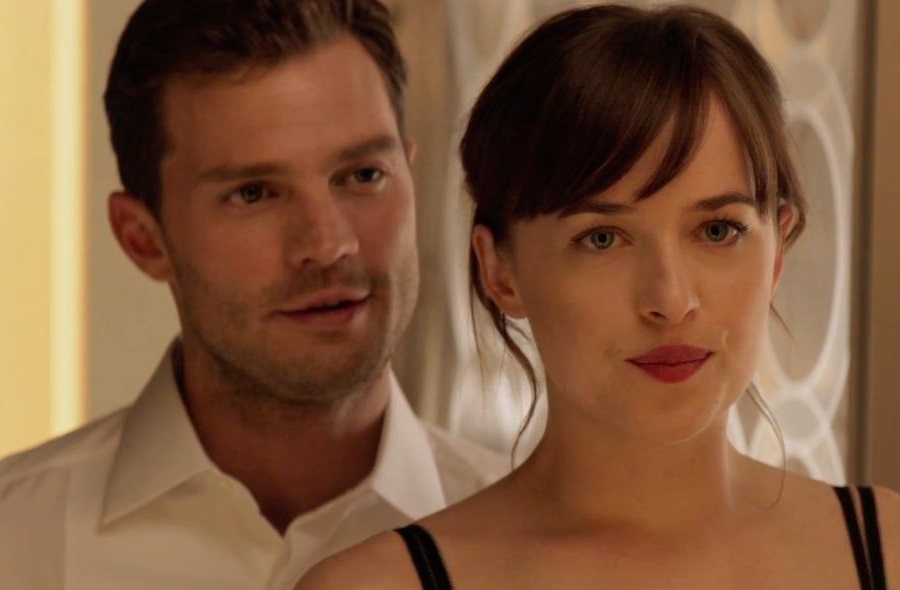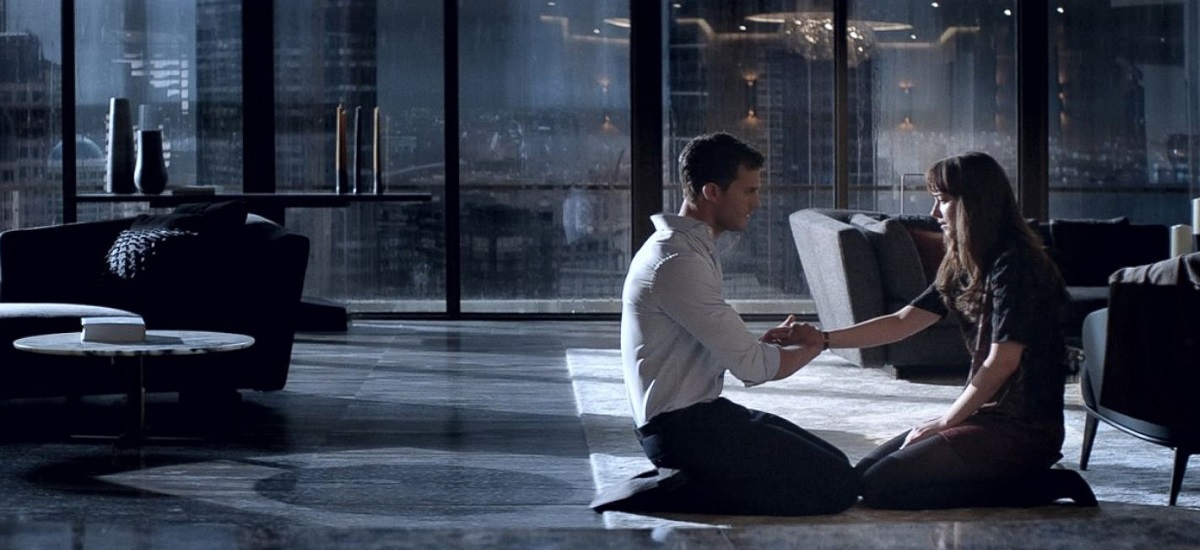50 Shades Darker exists in a nebulous void, where it only caters to die-hard fans of the books, or purveyors of “trash cinema”. If you are neither of those, the likelihood is high that you well be confused, or more likely bored for the duration.
Essentially the most expensive and wordy softcore porn ever made, it comes across like an assault on the audience. Characters talk, then screw, then argue or generally meander before the movie allows them to screw again. There is no true dramatic tension or stakes in play. The film “tries” to manufacture a few hurdles, with relatively little success. More often than not, events resolve themselves roughly 2 minutes after they’re introduced.
The film begins with a quick montage covering the few months directly following the events of 50 Shades of Grey. Ana (Dakota Johnson) appears to be thriving, if not entirely happy, at the literary company she works for. Meanwhile, Christian (Jamie Dornan) has been trying his best to keep his distance. Of course, he goes about doing so through traditionally creepy stalker actions. He continually sends her unwanted flowers. He has her followed. He even shows up at her friend’s art gallery showing, seemingly out of breath and slightly disoriented. If that weren’t mildly disconcerting, he then buys all the portraits of her that are on display, as he can’t stand the thought of others staring at her. Being a strong independent woman, Ana decides maybe she should give this guy another shot.
For the earliest of the earliest obstacles, the reignited couple must contend with is the reemergence of one of Christian’s former subs, Leila (Bella Heathcote). She doesn’t come off, though, as much of a stalker at first. As presented in the film, she looks like someone who has lost directions to the methadone clinic and lacks the skills to ask someone for them.
Seemingly worse for the wear is the development of Jack (Eric Johnson), the head literary editor at Ana’s work. In the span of 7 minutes, he goes from “nice guy boss” to “distant due to jealousy”, before settling into “lecherous and rapey.” It may track with how the character plays in the book, but on the screen it falls flat. Which makes sense in the end as any character in opposition to the leads is mere cannon fodder.
While the majority of the time Christian and Anna seem to talk through their problems, just as many scenes end with an awkward shrug. Christian at one point thinks he is being generous having $24k transferred to Anna’s bank account, but is more so flexing dominance. She correctly questions him as to why he had this info, but we cut to them happily eating lunch before any resolution. Here, she grabs the check before Christian can do so, flashing a wry smile. It’s the littlest of victories that matter, apparently.

The film goes out of its way to establish Anna as the most desirable thing ever, to anyone, without it every being questioned. Ultimately it hopes by the time the lights come up, you are as entranced as the filmmakers are, with Anna’s breasts. This isn’t a comment against Dakota Johnson, who tries to do the most she can with limiting work. She has shown recently that she is capable of standing tall with big talents, most notably in A Bigger Splash.
It’s bizarre that what’s supposedly a story about people falling in love, isn’t presented as such. Instead it comes across as two stubborn people attempting to connect via exploration of manipulation and kink. Christian’s is exerted sexually in the bedroom, where be wants total obedience. Anna, on the other hand, demands emotional obedience. We even hear Anna attribute her want to wait for sex to Bronte and Austen, who she read growing up. She says she was waiting for someone “special,” which equates to “rich sadistic sex maniac”; you know, every idealized young woman’s dream. Now, yes there are allusions in the film to works of both authors, but the way it comes across is lacking. Again, the film falters in execution.

© Universal Pictures
Trying to read into the undercurrents and motivations may seem idiotic, but at the same time, there has to be a critical or analytical slant taken. If not, then there runs the risk of movies not being challenged to say anything. The actors appear to be readily adding weight and subtext to matter that don’t have any real depth. It’s here that the real issues on display become readily apparent. A movie is being watched whose whole purpose is to see the two leads fall in love and engage in tawdry sexcapades. If we are to be totally honest, it’s a case of wanting to have their cake and eat it too, but the motivations are all wrong. It wants to focus on sex, but says the story is about love. The characters aren’t compelling in the least.
Take for instance one of the best received movies of 2016, The Handmaiden. It has all the elements 50 Shades Darker wants to encompass, but infinitely better execution and vision. There are interesting characters a plenty; it’s a beautiful and complex tale of love, loss and betrayal. There is rampant nudity throughout, including the much touted, but never embraced by Shades, graphic sex. Here, though, it moves the audience, as they have grown to care for the plight of its leads. The difference is partially simply in the presentation. Handmaiden has the shadow of “art house picture” to contend with, an unfortunate stigma that in no way should be viewed as a demerit. On the other sid,e 50 Shades Darker
only wants to feel slightly bawdy, while supplying a story devoid of dramatic heft or reason.
Due to the inert nature of the film, characters are introduced and dispatched at a moments notice. Kim Basinger arrives with a complete backstory, crucial to Christian’s past, as the woman who introduced him to S&M. Basinger looks like she found out she had little time left to live and convinced a gypsy to place her soul in a Madame Tussauds wax figurine. A late in the game confrontation of Basinger by Christian is specially cringe worthy: “You taught me to f@*#. Anna taught me to love.”
© In another instance, we see the establishing shot of a helicopter flying over mountains. It’s the first appearance of such a craft in the film. After less than 30 seconds, the engine malfunctions and careens off into the forest. Less then five minutes later, after Anna and the Greys are informed of Christian’s disappearance, he arrives back at his apartment, largely unscathed.
So then, what actually happens in this movie? Or, more so, what exactly is the point? It isn’t sexy. It isn’t thrilling. It isn’t dramatic. It most certainly isn’t cathartic on any level. The characters brush off any differences they’ve had in the past, under the guise of falling in love. This would be a noble gesture if it wasn’t gussied up in the name of “steamy, raunchy sex.” There is the inclination to suggest 50 Shades Darker as a curiosity watch, but should be done so, for free, at home, in your own red room, where no one is privy to the horrible decisions you may make.


